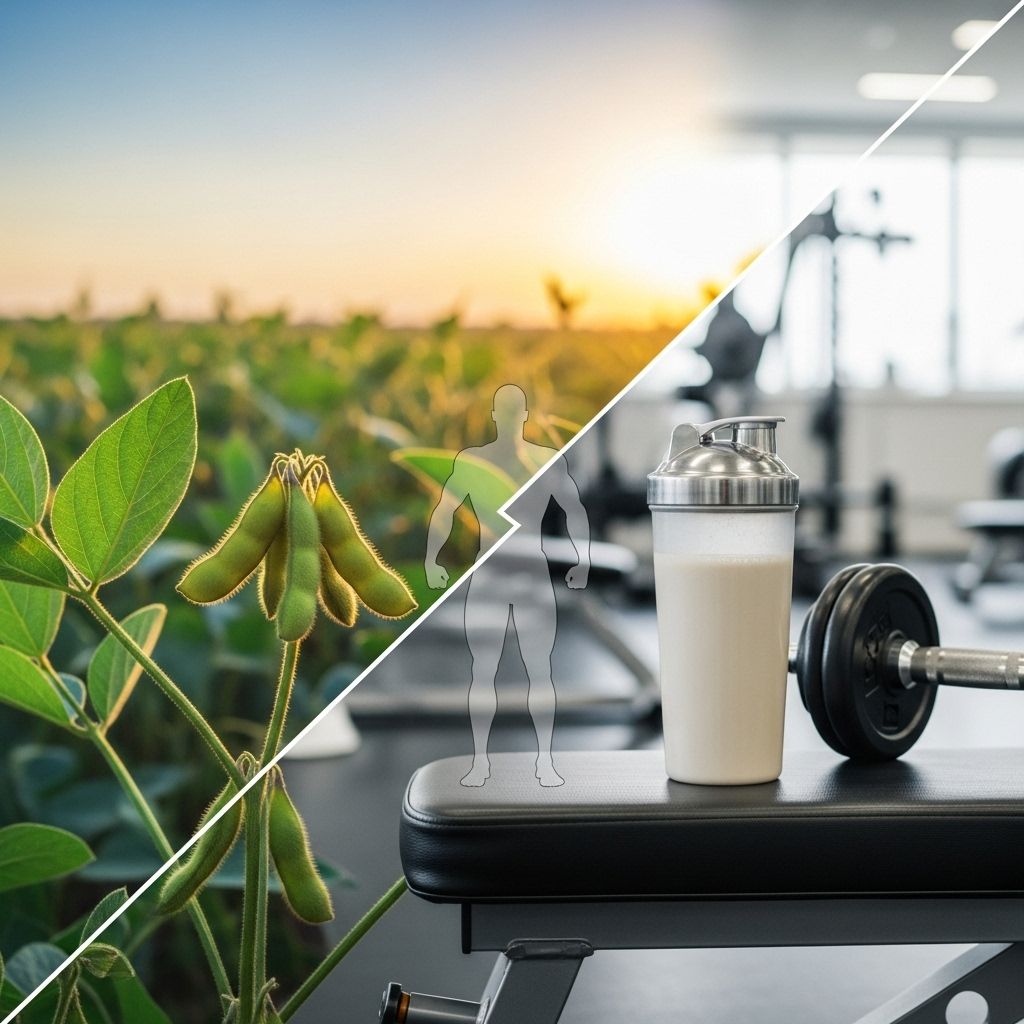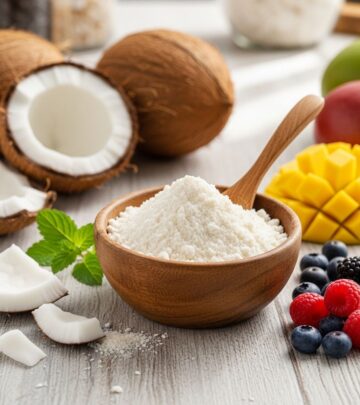Soy Protein vs Whey Protein: Benefits, Differences, and Which to Choose
Supplement choice can shape recovery efficiency, hunger control, and long-term wellness.

Soy Protein vs Whey Protein: A Comprehensive Comparison
Protein powders are a cornerstone in fitness and nutrition, especially for those looking to build muscle, lose weight, or simply boost their protein intake. Among the most debated options are soy protein and whey protein. Both are complete proteins, but they differ in origin, nutritional profile, digestibility, health benefits, and suitability for different lifestyles. This guide examines their science, benefits, drawbacks, and offers guidance on how to choose the best option for your goals.
What Is Soy Protein?
Soy protein is a plant-based protein extracted from soybeans. It’s available in two common forms:
- Soy Protein Isolate: Highly refined, containing about 90% protein and minimal fat or carbs.
- Soy Protein Concentrate: Less refined, contains about 70% protein, with some remaining fiber and carbohydrate.
Soy protein is vegan and considered a complete protein because it contains all nine essential amino acids. It’s popular among those on plant-based or dairy-free diets.
What Is Whey Protein?
Whey protein is a dairy-derived protein sourced as a byproduct during cheese production. There are three major types:
- Whey Protein Concentrate: Contains 70-80% protein along with some fat and lactose.
- Whey Protein Isolate: Filtered further to contain 90%+ protein and very little fat or lactose.
- Whey Protein Hydrolysate: Pre-digested for faster absorption and less allergenicity.
Whey is also a complete protein, with a particularly high biological value, excellent digestibility, and a strong reputation in athletic circles.
Comparing Nutrition: Soy vs Whey Protein
| Feature | Soy Protein (per 30g) | Whey Protein (per 30g) |
|---|---|---|
| Source | Plant-based (soybean) | Dairy-derived |
| Protein (approx.) | 27g | 24g |
| Carbohydrates | 1-3g | 1-2g |
| Fat | 0.5-2g | 0.5-2g |
| Lactose | None | Present (none in isolate/hydrolysate) |
| Essential Amino Acids | All (complete) | All (complete) |
| BCAAs (Leucine, Isoleucine, Valine) | Lower | Higher |
| Fiber | Trace to 1g | None |
Both provide high-quality protein, but their amino acid profiles and micronutrient content differ slightly, impacting their effects on the body.
Amino Acid Profile & Digestibility
One of the most important factors distinguishing soy and whey is their amino acid composition:
- Whey protein is especially rich in Branched-Chain Amino Acids (BCAAs)—leucine, isoleucine, and valine—which play a major role in stimulating muscle protein synthesis and facilitating post-exercise recovery.
- Soy protein offers a balanced spectrum of all essential amino acids but is typically lower in methionine and BCAAs compared to whey.
- Both are considered complete proteins, suitable for supporting muscle growth and repair.
Digestibility is another consideration:
- Whey protein is highly digestible and rapidly absorbed.
- Soy protein is slower to digest due to the presence of plant-based fibers and compounds such as protease inhibitors.
Mixability, Taste, and Texture
Taste and texture influence user experience:
- Whey protein has a mild flavor with a smooth, creamy texture.
- Soy protein tends to have a stronger, nutty flavor and can be slightly grittier.
- Both mix well in shakes and smoothies; product quality and added flavors will vary by brand.
Health Benefits: Soy Protein vs Whey Protein
Weight Loss and Body Fat Reduction
- Whey protein has been shown to be more effective for weight loss and reducing body fat in clinical studies.
- In multiple studies where overweight participants consumed similar calories from whey or soy protein, the whey group lost significantly more body weight and fat, while the soy group often showed little added benefit over carbohydrate control groups.
- Whey protein may lower levels of the hunger hormone ghrelin, thereby reducing appetite and promoting fat loss.
- Soy protein’s effects on weight loss are less consistent and may not be as pronounced as whey’s.
Muscle Building and Recovery
- Both whey and soy protein provide all essential amino acids required for muscle growth.
- However, research consistently shows whey leads to greater increases in muscle protein synthesis—both at rest and after resistance exercise, owing to its rapid absorption and BCAA content.
- Long-term studies show subjects supplementing with whey protein gain more lean body mass compared to those using soy.
- Soy protein can still support muscle maintenance and is effective for vegans when paired with a resistance training program.
Cardiovascular, Metabolic, and Other Health Effects
- Soy protein contains isoflavones (phytoestrogens) which may help lower LDL cholesterol and improve heart health in some groups.
- Some research links soy intake to improved blood flow and reductions in blood pressure.
- Whey protein may support immune function (contains immunoglobulins) and promote lower blood pressure due to its bioactive peptides.
Potential Drawbacks
- Soy protein contains compounds such as lectins and phytic acid, which some claim can impair mineral absorption. However, effects in balanced diets are minimal.
- Phytoestrogens in soy can mimic estrogen in the body, but most studies show no adverse effect on testosterone levels in men or overall hormonal health when consumed in moderation.
- Some individuals may experience digestive issues from whey protein due to lactose or milk protein sensitivity (tolerated better in the isolate or hydrolysate form).
- Soy allergies, while less common, may necessitate avoidance of soy protein.
Price, Accessibility, and Suitability
Soy protein is generally cheaper than whey, making it a good option for those on a budget or seeking a plant-based product. Whey protein tends to be slightly more expensive but is widely available and comes in a range of product types.
Who Should Use Soy Protein?
- Vegans and vegetarians seeking a complete protein
- Individuals with dairy intolerance or milk allergies
- Those interested in plant-based heart health benefits
Who Should Use Whey Protein?
- Individuals focused on rapid muscle building and recovery
- Those seeking maximum protein quality and digestibility
- People without dairy sensitivities or lactose intolerance
How to Choose: Key Decision Points
- If muscle gain and fat loss are top priorities, whey protein is typically superior.
- If you require a plant-based, vegan-friendly, or dairy-free option, soy protein is an excellent choice.
- For budget-friendly supplementation, soy protein tends to cost less.
- Always consider personal tolerance (allergies, sensitivities) and desired taste/texture.
- Both can complement a healthy diet and workout program.
Frequently Asked Questions (FAQs)
Q: Is soy protein as effective as whey protein for muscle building?
A: Both soy and whey proteins support muscle growth. However, whey protein has a slight edge due to its higher BCAA content and faster absorption, leading to higher rates of muscle protein synthesis post-exercise. Soy is still an effective option for those adhering to plant-based diets.
Q: Can men consume soy protein without affecting testosterone levels?
A: Large-scale studies indicate that moderate soy protein intake does not lower testosterone or adversely affect hormone levels in men.
Q: Which protein is better for weight loss?
A: Whey protein has been shown in clinical trials to promote greater fat loss and reductions in waist circumference compared to soy, especially when combined with regular exercise.
Q: Is soy protein suitable for people with lactose intolerance?
A: Yes. Soy protein contains no lactose, making it a safe option for those with lactose intolerance or dairy allergies.
Q: Is it okay to combine soy and whey protein?
A: Combining the two is safe and may allow you to benefit from the strengths of both protein sources, particularly if you seek protein diversity in your diet.
Bottom Line
Both soy protein and whey protein offer complete, high-quality nutrition. Whey protein ranks higher for muscle building and weight loss among most users, while soy protein remains the leading plant-based option and may confer added heart health benefits. Choosing the right protein depends on your diet, fitness goals, physiological needs, and ethical preferences.
References
- https://levelsprotein.com/blogs/supplements/soy-protein-vs-whey-protein
- https://www.insidetracker.com/a/articles/soy-protein-vs-whey-protein-which-one-is-better
- https://us.myprotein.com/thezone/supplements/whey-protein-vs-soy-protein-which-is-best/
- https://nuts.com/healthy-eating/soy-vs-whey-protein
- https://pubmed.ncbi.nlm.nih.gov/33971994/
- https://www.issaonline.com/blog/post/soy-protein-vs-whey-protein-whats-best-for-your-goals
- https://soylent.com/blogs/news/whey-vs-soy-protein-powder-the-difference
- https://www.athleticlab.com/a-comprehensive-comparison-of-whey-casein-and-soy-protein/
- https://pmc.ncbi.nlm.nih.gov/articles/PMC7312446/
Read full bio of Sneha Tete













